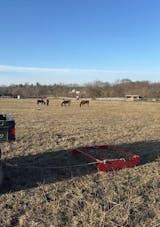If you live in the UK, you already know that rain is just part of the deal. Some weeks it feels like the downpours never stop. And when the fields are soggy and the arena is flooded, your usual riding plans go out the window.
But just because you can’t ride doesn’t mean your horse has to stand around bored. In fact, keeping your horse mentally stimulated on rainy days can be just as important as giving them physical exercise.
Bored horses often develop bad habits. They might chew wood, pace fences, or become difficult to handle.
But with a little creativity, you can turn rainy days into useful, even fun, opportunities to work on trust, manners, and brain training. Here’s how you can keep your horse sharp, happy, and connected to you, even when the skies won’t clear.
Use the Stable as a Training Zone
If your horse is stuck in the stable, you can still make that time valuable.
Work on simple groundwork that fits within the space. Practice standing still when asked. Try asking your horse to move back just using light pressure or even a voice cue.
You can also work on yielding the hindquarters or moving the shoulders away. These quiet exercises help teach your horse to respect space and listen closely to your body language.
You can also train your horse to lower their head on cue, which is great for calming them down and teaching the beginnings of relaxation.
Try getting them to focus on you by asking them to touch a target, like a cone or your hand.
These little games may seem small, but they keep your horse’s mind engaged and build trust between you.
Teach Tricks for Mental Focus
Rainy days are perfect for teaching tricks. These can be simple like picking up a foot when you ask or touching a ball with their nose.
Some owners teach their horse to smile or nod. These aren’t just party tricks. They teach your horse how to learn and how to enjoy the process.
Keep sessions short and positive, offering lots of praise and maybe a treat now and then.
Teaching tricks improves your timing and your horse’s willingness to try new things. The focus should be on fun and curiosity, not perfection.
If your horse seems frustrated or confused, go back a step or finish on something they already know.
Use Feed Time as Enrichment Time
Instead of dropping feed into the bucket and walking away, turn mealtime into a puzzle. Hide carrots or apples inside a hay net or forage ball.
Scatter low-calorie treats in their bedding or hay so they have to sniff around to find them. You can also use slow feeders to make them eat more slowly and keep them thinking as they chew.
This type of feeding mimics the natural grazing behaviour of horses. In the wild, they would spend most of their day searching for food.
Letting them forage, even in a small way, gives them something to do and reduces stable boredom.
Build Trust Through Grooming and Bonding
Spending quiet time with your horse can be just as stimulating as riding. Long, slow grooming sessions help strengthen your relationship. Use different brushes and massage areas they enjoy. Watch how they respond. Some horses lean into a soft curry comb on their neck or relax when you scratch their withers.
You can also explore desensitisation by introducing gentle new experiences in the stable. Rub them with a plastic bag or show them a noisy object while staying calm.
Let them investigate at their own pace. This builds confidence and teaches them to trust you when something new appears in the real world.
Try Indoor Obstacle Challenges
If you have access to an indoor space, even a barn aisle, create a little obstacle course. Lay out poles to step over or weave around.
Use cones, buckets, or tarps to challenge your horse’s confidence. Ask them to back up through a narrow space or walk calmly over a crinkly surface.
These activities help with body awareness and mental control.
They also teach your horse to look to you for guidance. The goal is not to rush through but to stay relaxed and focused.
Always reward calm behaviour and give your horse plenty of time to think.
Wrap Up
Rainy days in the UK are part of the horse-owning life, but they don’t have to be boring or wasted. With a little imagination and patience, you can turn wet weather into a chance to connect with your horse on a deeper level.
Whether you’re teaching a new trick, offering a puzzle feeder, or just grooming with purpose, you’re giving your horse what they need most, your time and attention.
When the sun finally returns and the ground dries up, you’ll find that your horse hasn’t missed a step.
They’ll be more attentive, more confident, and more in tune with you. And best of all, you’ll have used every day, rain or shine, to build something that lasts longer than the weather.




























